Blog
Improving Your Inner Dialogue – Part 1

One of the biggest issues many people face throughout life has very little to do with their interpersonal relationships. The relationship a person has with himself or herself ranks a lot higher—and takes precedence over—what transpires when interacting with others. At the core of this relationship is an on-going internal dialogue that can contain positive or negative communication. In the context of this dialogue, many people are often very hard on themselves. They find fault with their personality, choices, body and/or life and become hypercritical.
At Above & Beyond Acupuncture we encounter many patients who need help improving their inner dialogue. With this being such a common issue, we felt it would be worthwhile to address the subject in a blog post. The conversation that you have with yourself is extremely important. Properly understanding it, and learning how to improve it, will alleviate a lot of suffering and self-destructive thought patterns.
What is an internal dialogue?
A simple explanation is that it is a conversation taking place in your head all day long, from the moment you wake up until the moment you go to bed. There is rarely a moment when this internal dialogue is not taking place. It continues throughout all of your daily activities, providing commentary which is oftentimes full of judgments and gossip. It is filled with assumptions, perceptions and mental chatter. There are times when your internal dialogue will trigger emotions; this can cause a response leading a person to act out. When the internal dialogue elicits a strong emotion, it can create a situation where the thought process completely abandons the present to instead focus on a past or future event.
It is important to note that every person has an internal dialogue. There are some who have learned how to harness it, while others are completely dominated by it. Having an internal dialogue doesn’t make a person abnormal; it’s actually quite a normal function of being a human being.
How can I improve my internal dialogue?
The first step is to be aware of the conversation that is taking place. You must be conscious of it. It’s important that you pay attention to the words, thoughts and energy being used within this dialogue. Many times we stop paying attention; we’re distracted by what is taking place around us. This can be a challenging situation, because without actively monitoring this internal conversation, it can become negative, constraining and destructive. One of the best methods you can use to observe your inner dialogue is something that people have been doing for centuries. Meditation is one of the best tools we can use on a daily basis to allow us to be more conscious of our thoughts. In a previous blog titled “The Many Benefits Of Meditation” we discussed what meditation is and provided some examples of different techniques. If you’re looking for a very effective and simple way to begin to observe your inner dialogue, we suggest you look into meditation and practice it often.
While becoming more aware of your internal dialogue, you might discover (or maybe you’ve known for a while) that you’re very hard on yourself. Many people who are hard on themselves grew up with parents who were demanding and critical. At some point during their development, this behavior became imprinted. No longer did a parent have to provide the criticism; it was now self-inflicted. This can become even more of a problem when a person is sick, tired, or under stress, as those are times when it’s more difficult to have clarity and be present. It’s not enough simply to say “stop being so hard on yourself.” Anyone who has locked into this will tell you how deeply rooted this type of internal dialogue can be. So what can be done? As we discussed earlier, it’s essential that you become conscious of this type of thinking. Shining a light on it is the first step toward changing it. Look at the train of thought; think about how unhealthy and untrue it is. You can then address it; you can invoke a dialogue that challenges those destructive and constricting thoughts. It’s important that you understand and believe that being so self-critical is neither necessary nor justified. It doesn’t serve you and it doesn’t make you feel good. In a previous blog post we talked about a technique called “reframing.” This is a powerful tool that you can use to reframe the thoughts and the dialogue taking place within you. By replacing the negative words with positive, uplifting and supportive ones, you can begin to feel better about yourself.
In part 2 of this series we will talk more about techniques you can use to improve your inner dialogue. It is our intention to raise awareness of this conversation taking place within all of us.









